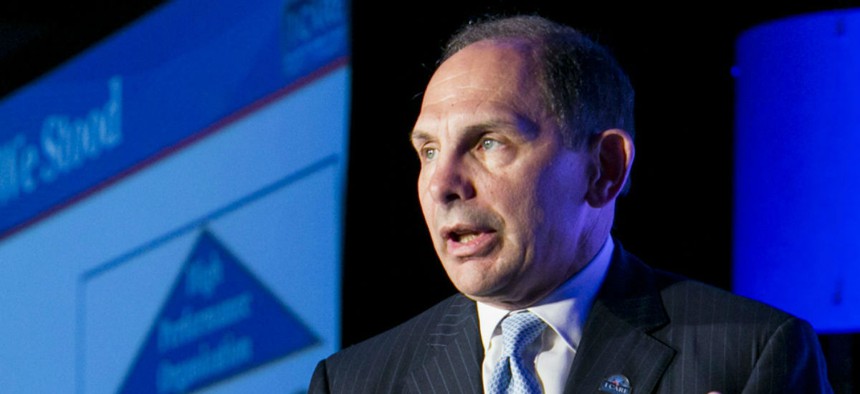
VA Secretary Bob McDonald speaks at the Excellence in Government conference. Kristoffer Tripplaar
VA Secretary: Employees Need to Be 'Exalted,' Not Undervalued
Bob McDonald tells government leaders that the department has to empower employees to successfully meet its mission of serving the veteran.
Serving veterans is the No. 1 priority for the Veterans Affairs Department, but empowering employees is equally important, said the VA secretary on Thursday.
“When a crisis occurs, what organizations do is, they stop training, they stop investing in employees,” said Bob McDonald during Government Executive Media Group’s Excellence in Government conference on Thursday. “We have put together a program now where we are going to overinvest in employees. We have no hope of improving the veteran experience if we don’t improve the employee experience.”
At the event, McDonald outlined his departmentwide management reform effort, launched late last year after the debacle involving data manipulation and excessive patient wait times at the Phoenix, Ariz., VA facility surfaced. Those problems cost former VA Secretary Eric Shinseki his job; McDonald took over last summer. The last year has featured a series of scathing inspector general reports detailing problems ranging from mail mismanagement and data manipulation to employee retaliation at VA facilities throughout the country.
With his “MyVA” approach, the former chief executive officer of Proctor and Gamble is bringing the business world’s laser-like focus on the customer to a government agency known for intractable bureaucracy. At the top of the agency hierarchy is the veteran, not the secretary, McDonald said Thursday, emphasizing his effort to change the culture and way of thinking within the department. Empowering and training employees comes after the veteran, and is just as important, he said.
“The people who then serve those customers should be exalted, they should be trained,” McDonald said. The Office of Personnel Management “had downgraded many of our positions that interfaced with the customer because we had descriptions of those positions that were 20 and 30 years old. [The employees] were undervalued, whereas those people should be exalted.”
McDonald told the audience of government leaders that VA has created an intranet, encouraging employees to share their ideas of “how we can improve.” He also talked about an initiative dubbed “VA 101,” which is “a training program designed by employees for employees to improve the veterans’ experience.”
McDonald, who has visited 147 VA facilities across the country since becoming secretary in July 2014, said what he heard from employees was “they felt like they were members of a system that constrained them and that they couldn’t change. I knew I had to change that.” Leadership had been “cocooned away from employees,” he added, noting that that was one reason why he gave out his cell phone number at a press conference last September.
The secretary has his work cut out for him, especially since every day seems to bring a fresh negative news story or congressional hearing about the department. Several bills are floating around both chambers of Congress that would make it easier to fire misbehaving employees. (The 2014 Veterans Access, Choice and Accountability Act made it easier to fire senior executives, but many lawmakers have complained the department isn’t using that authority sufficiently.)
After Thursday’s event, McDonald said VA should “not be singled out versus other parts of the government” when it comes to making it easier to fire employees or clawing back bonuses, adding it would make it harder for the department to recruit and retain people. “Since I’ve been secretary, we’ve fired 1,000 people. We have investigations ongoing,” he said. “Accountability is important to us.”
Asked whether he would support legislation that applied some of those ideas (making it easier to fire federal workers and rescinding the bonuses of bad apples), he said, “I’d have to see the legislation.”
NEXT STORY: The Weakening Definition of 'Diversity'







